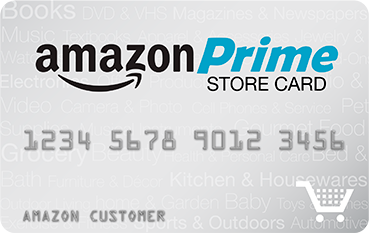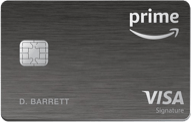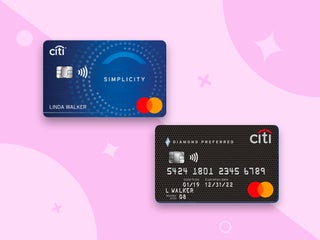Summary
If you want to earn rewards on Amazon purchases and unlock exclusive financing deals, an Amazon co-branded credit card may be worth a look. Regardless of your credit score, you should be able to find a fit with either Synchrony Bank or Chase.
The content on this page is accurate as of the posting date; however, some of our partner offers may have expired. Please review our list of best credit cards, or use our CardMatch™ tool to find cards matched to your needs.
If you do a lot of online shopping, Amazon.com is likely one of your first stops – so much so that you may be considering applying for an Amazon-branded credit card to earn rewards or finance purchases. But at a glance, deciding which card to get can be a challenge.
You have two main routes to consider: A store-only credit card from Synchrony Bank or a traditional credit card from Chase.
From Synchrony, there’s the Amazon Store Card and its counterpart for Amazon Prime members, the Amazon Prime Store Card; and from Chase, there’s the Amazon Rewards Visa Signature Card and its counterpart for Prime members, the Amazon Prime Rewards Visa Signature Card.
Luckily, despite some similarities, each of these cards is geared toward a very specific consumer, and deciding which is best for you comes down to two key questions: Are you a Prime member? and, what’s your credit score?
See related: Best credit cards for Amazon purchases
Amazon Prime Store Card vs. Amazon Prime Visa card: At a glance
Synchrony and Chase each offer two versions of their Amazon cards – one for Prime members and one for nonmembers – and you’re automatically assigned one or the other when you apply.
Whether you opt for an Amazon store card from Synchrony or an Amazon Visa from Chase, being a Prime member is key if you want to maximize your rewards on Amazon purchases.
While you’ll earn 5% back on Amazon purchases with either the Amazon Prime Store Card or the Amazon Prime Visa card, the two cards vary considerably in other areas, including their sign-up bonuses, approval odds and cardholder benefits.
 Amazon Prime Store Card |  Amazon Prime Rewards Visa Signature Card | |
| Rewards rate | 5% cash back on Amazon.com purchases |
|
| Sign-up bonus | $100 Amazon.com gift card | $150 Amazon.com gift card |
| Annual fee | $0 (but requires $119 Amazon Prime membership) | $0 (but requires $119 Amazon Prime membership) |
| Card perks |
|
|
| Estimated earnings in first year ($15,900 spend) | $124 | $401 |
Amazon credit cards: Key differences
Amazon store cards issued by Synchrony Bank share some key features with the Amazon Visa cards issued by Chase – including exclusive Amazon financing offers and a chance at bonus rewards on Amazon purchases. But they are completely separate products geared toward very different consumers. Here are some of the most important differences to keep in mind.
Open vs. closed loop
The most obvious difference between the Synchrony Amazon cards and the Chase Amazon cards is their reach.
Like most store credit cards, Synchrony’s Amazon cards are “closed loop” credit cards. Closed-loop cards can only be used at a specific store or family of brands – in this case, only on Amazon.com and Audible.com purchases and with select Pay With Amazon merchants. Chase’s Amazon cards, in contrast, are “open-loop” cards, which can be used anywhere Visa cards are accepted, online or off.
Approval odds
Another major point of departure for these two card suites is their credit requirements. While you can qualify for one of Synchrony’s Amazon store cards with only a fair credit score, you’ll likely need at least a good credit score to qualify for one of the Amazon Visa cards from Chase.
Unfortunately, while you can prequalify for some Chase cards on the issuer’s website, neither Synchrony nor Chase currently offers prequalification on their Amazon credit cards. The Amazon store cards do offer instant approval, however, so you can find out if your application was approved within seconds.
See related: What affects your credit score?
Rewards programs
The Amazon Prime Store Card from Synchrony and the Amazon Prime Rewards Visa Signature card from Chase each offer 5% back on Amazon.com purchases, but the latter card also comes with 2% back on restaurant, gas station and drugstore purchases and 1% back on all other purchases.
Meanwhile, the Amazon Rewards Visa Signature Card, designed for cardholders who are not Prime members, offers just 3% back on Amazon.com and Whole Foods purchases but carries the same rate as the Amazon Prime Rewards Visa in other categories: 2% back on restaurant, gas station and drugstore purchases and 1% back on all other purchases.
Without a Prime membership, the Amazon Store Card earns no rewards.
Additionally, the rewards you earn with Synchrony’s Amazon Prime Store Card are much less flexible than those you earn with a Chase Amazon card. Amazon Prime Store Card rewards can only be used for purchases on Amazon.com, while Amazon Visa card rewards can be redeemed in a variety of ways, including as cash back in the form of a deposit or statement credit, for Amazon purchases and for travel.
Best for building credit: Amazon Prime Secured Card
If you have a limited credit history or are working on rebuilding your credit after a few financial missteps, both the Amazon store cards and the Chase Amazon cards may be temporarily out of reach. And since nearly every new credit card application will result in a hard pull of your credit report, it makes sense to limit applications to cards that offer a decent chance at approval.
A great starting point is the Amazon Prime Secured Card, a secured version of the Amazon store cards. Also issued by Synchrony Bank, the Amazon Prime Secured Card charges no annual fee but requires you to put down a refundable deposit of $100 to $1,000 (in $50 increments), which doubles as your credit limit.
To start, the card offers 2% back on Amazon.com purchases for Prime members. After 12 months of responsible use, you may be able to graduate to an unsecured Amazon store card, get your deposit back and boost your cash back rate to 5% on Amazon.com purchases with a Prime membership. The card also charges an ultra-low fixed APR of just 10% and a late fee of up to $5 (far lower than the up to $40 you typically find on credit cards).
Once your credit score improves, you can also look for a more flexible cash back credit card like one of the Amazon Visa cards. Just keep in mind that since the Amazon store cards and Amazon Visa cards have different issuers, you can’t request a product change from one to the other. You’ll need to put in a separate application and face a separate hard credit inquiry.
See related: How a secured card helped my credit score
Best for average credit: Amazon Prime Store Card
If, on the other hand, you have at least a middle-of-the-road credit profile, one of the Amazon store cards from Synchrony will be your best bet, as these cards offer much more favorable approval odds than the Amazon Visa cards. Assuming you pay on time and keep your balances low, store cards like these can be a great tool as you work to move your credit from average to good.
The wide variety of items available on Amazon.com may also make these cards a smarter financial choice than the typical closed-loop store card, as you can use your Amazon store card for both practical items and the occasional indulgence. If you’re a Prime member, you’ll still earn rewards, and, unlike many unsecured credit-building cards, the Amazon store cards charge no annual fee.
Best for earning rewards: Amazon Prime Rewards Visa Signature Card
Whether you’re a Prime member or not, Chase’s Amazon cards win out easily on the rewards front. These cards offer many more opportunities to earn rewards on everyday spending and are much more flexible.
Indeed, even with its lower rewards rate on Amazon purchases, the Amazon Rewards Visa Signature Card beats out the Amazon Prime Store Card – thanks to rewards flexibility and a higher average rewards rate across purchases outside of Amazon.com.
There’s also a stark contrast when it comes to sign-up bonuses. On either Amazon store card, new members get a $100 Amazon.com gift card upon approval, compared to a $150 and $50 gift card with the Amazon Prime Rewards Visa and Amazon Rewards Visa, respectively.
Best for Amazon financing: It depends
While both the Amazon store cards from Synchrony Bank and the Amazon Visa cards from Chase come with promotional Amazon financing offers for cardholders, the terms are slightly different.
If you’re looking to pay off an Amazon purchase over time and are debating which route to go, you may need to choose between a longer financing period (but a higher APR and minimum purchase requirement) and a lower minimum purchase requirement (but a shorter financing period).
Both cards let you choose between Equal Pay financing – which charges no interest if you make your equal monthly installment payments on time – and Special Financing – which uses a deferred interest model.
While the difference is not dramatic, Synchrony’s Amazon store cards offer longer financing periods on Equal Pay purchases. With the store cards, you can get six, 12 or 24 months to pay off your minimum purchase of $150, $600 and $800, respectively. The Chase Amazon Visa cards, on the other hand, offer six-, 12- and 18-month financing plans on minimum purchases of $150, $250 and $500, respectively.
Keep in mind, the 25.99% variable APR on Synchrony’s Amazon store cards is fairly high compared to the average credit card interest rate and could come back to bite you if you opt for Special Financing.
See related: Can you transfer a store card balance to a credit card?
Which Amazon credit card is best for you?
Along with your Prime membership status, your credit score will be the main factor in deciding which Amazon credit card is the best match for you.
If you have a damaged credit score or a limited credit history – or even if your credit score is just average – you’ll likely have a hard time qualifying for one of the Amazon Visa cards from Chase. Stick with one of the secured or unsecured Synchrony store cards while you build your score, after which you can apply for a more lucrative Amazon credit card from Chase.
If, on the other hand, your score is in good shape, one of the Chase Amazon cards is the obvious choice, as you cannot only earn more plentiful (and more flexible) rewards but also enjoy a lower APR and take advantage of Amazon financing on large purchases.
*All information about the Amazon Prime Rewards Visa Signature Card, the Amazon Rewards Visa Signature Card and the Amazon Prime Secured Card has been collected independently by CreditCards.com and has not been reviewed by the issuers.
Editorial Disclaimer
The editorial content on this page is based solely on the objective assessment of our writers and is not driven by advertising dollars. It has not been provided or commissioned by the credit card issuers. However, we may receive compensation when you click on links to products from our partners.




